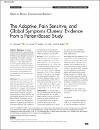The Adaptive, Pain Sensitive, and Global Symptoms Clusters: Evidence from a Patient-Based Study
Date
2023-04-28Metadata
Show full item recordAbstract
Objectives: The largest epidemiologic study conducted about painful temporomandibular disorders (pTMDs) to date identified 3 clusters of individuals with similar symptoms—adaptive, pain sensitive, and global symptoms—which hold promise as a means of personalizing pain care. Our goal was to compare the clinical and psychological characteristics that are consistent with a pTMD clinical examination among patients who are seeking care and assigned to the different clusters. Methods: This cross-sectional study used data from the medical records of patients attending Duke Innovative Pain Therapies between August 2017 and April 2021 who received a pTMD diagnosis (i.e., myalgia) and consented to have their data used for research. Data included orofacial and pain-related measures, dental features, and psychological measures. We used the Rapid OPPERA Algorithm to assign clusters to patients and multinomial regression to determine the likelihood (odds ratios [OR] and 95% confidence intervals [CI]) of being assigned to the pain sensitive or global symptoms cluster attributed to each measure. Results: In total, 131 patients were included in this study and assigned a cluster: adaptive (n = 54, 41.2%), pain sensitive (n = 49, 37.4%), and global symptoms (n = 28, 21.4%). The PS cluster displayed greater numbers of temporomandibular joint sites (OR, 1.29; 95% CI, 1.01 to 1.65) and masticatory (1.48; 1.19 to 1.83) and cervical (1.23; 1.09 to 1.39) muscles with pain evoked by palpation. The GS cluster displayed greater scores of pain catastrophizing (1.04; 1.01 to 1.06) and perceived stress (1.23; 1.03 to 1.46) and was more likely to report persistent pain (16.23; 1.92 to 137.1) of higher impact (1.43; 1.14 to 1.80). Conclusion: Our findings support that care-seeking patients with pTMDs who are assigned to the GS cluster display a poorer psychological profile, even though those assigned to the PS cluster display more measures consistent with orofacial pain. Findings also establish the PS cluster as a group that does not display psychological comorbidities despite being hypersensitive. Knowledge Transfer Statement: This study informs clinicians that patients seeking care for painful temporomandibular disorders, in specific cases of myalgia, can be classified into 1 of 3 groups that display unique profiles of symptoms. Most importantly, it emphasizes the importance of examining patients with painful temporomandibular disorders in a holistic manner that includes assessing symptoms of psychological distress. Patients with greater psychological distress will likely benefit from multidisciplinary treatment strategies that may include psychological treatments.
Collections
- Dental Medicine Research [449 items ]


